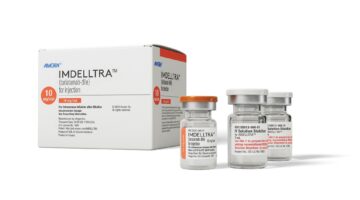
The story didn’t make national news. But as a pharmacist, it spoke to me on a visceral level: Ohio’s Board of Pharmacy fined one pharmacy for $250,000 in February, citing a 2021 investigation that revealed understaffing, unsafe storage for medications, 10 cars in the drive-thru with not enough staff to service them, and the fact that the pharmacy was 30 days behind in filling prescriptions.
Imagine not being able to fill your prescription for 30 days. What if the prescription was your mom’s? Your kid’s? What about patients with chronic conditions, or transplants, or cancer, or those who may need daily medications to live? This one fine levied at this one pharmacy is living proof that all the margins in the prescription drug industry have been so eroded that the healthcare ecosystem is running on a skeleton, with patients left holding the empty prescription bag.
Much has been made of how we’ve gotten here, with blame spread to the pharma manufacturers, the pharmacy benefit manager (PBM) middlemen, vertical integration and monopoly power of conglomerates, and more. But the question is: How do we move forward?

BioLabs Pegasus Park Cultivates Life Science Ecosystem
Gabby Everett, the site director for BioLabs Pegasus Park, offered a tour of the space and shared some examples of why early-stage life science companies should choose North Texas.
The answer: We must realign the financial incentives and democratize access through data sharing. Pharma needs to lead the charge, but employers and pharmacies must also be agents of change. Here’s how we can do it.
Realign financial incentives by connecting pharma and employers directly
There’s a reason the Big 3 PBMs own more than 80% of the market and are in the Fortune 25. It all comes down to the money. Pharma shells out billions in rebates, but those billions are not offsetting the cost of their products, so where does it go? Though employers do receive a portion of the rebates, PBMs and their Group Purchasing Organizations (GPOs) typically keep part of the rebates, and/or add admin and data fees to the rebates that they then pocket. It is estimated these fees can total up to about 5-11% of the WAC, or Wholesaler Acquisition Cost. These fees have nothing to do with the actual cost of the drug – and are incremental to the administrative fees that PBM’s may charge employers for managing the same benefit services.
Additional practices of PBMs to hold on to profits are well established by now and under scrutiny from regulators. But let’s boil it way down: Pharma knows what they pay in rebates. Employers know what they spend on drugs. But these two healthcare players are disconnected from each other by the PBMs, who obscure the flow of money in their contracts. Pharma and employers have no way to reconcile their spending to know – are we getting a good deal? A competitive one? A fair one? Without the receipts, no one can tell.

With the Rise of AI, What IP Disputes in Healthcare Are Likely to Emerge?
Munck Wilson Mandala Partner Greg Howison shared his perspective on some of the legal ramifications around AI, IP, connected devices and the data they generate, in response to emailed questions.
Free the data to understand the real cost of drugs and improve outcomes
Speaking of receipts: The PBMs rob us from a lot, but one of those things is knowledge. They are the masters of the data, and they obscure it in their complicated, confusing contracts. Even if an employer becomes an expert in contract language, there are so many loopholes and loose definitions that the PBMs can get around almost anything. The system is PBM-created, and they know how to game it.
Without the data – the cost information, what was paid to the pharmacy, the utilization of the drug, the success of the drug, more – we can’t really change anything about the system. But when we know better, we do better. A new prescription drug system must connect the data from the pharmacies to the claims at the prescription level, returning that data back to employers, pharma, and centers of excellence so that all players know the outcomes. Freeing the data creates an informed view for patient care, which helps impact health outcomes.
The solution: Bring the players together on a direct pharma marketplace
These issues are the side effects; the root diagnosis is a broken system. So to make change, we have to attack the core issue. Pharma should seek alternative market-access channels that allow them to control the price of their product in-market. That channel has to decouple fees from WAC and transition to transactional-based fees.
In a new direct pharma marketplace, pharma can contract directly with employers, finally controlling their price in-market while having the data to understand the true cost of their therapies. Without the legacy PBMs in the way, think of the possibilities:
- Pharma can reestablish a direct relationship with patient-members; access real-time data on product adoption, utilization, and medication success to help develop products and services in a more informed manner; and capture higher gross-to-net profits, which allow for the R&D that will cure the next disease.
- Employers can actually know what they’re paying for prescription drugs and focus on a lowest net cost approach to pharmacy benefits.
- Pharmacies can end the reimbursement games that PBMs play and, to bring it back to that Ohio fine, afford to staff appropriately without the financial threat of bankruptcy.
Let’s go back to the beginning. At that Ohio pharmacy, there were real patients who probably couldn’t get their prescriptions for 30 days. In a broken system, the patient pays the ultimate price.
But in a simplified, connected, sustainable, financially aligned marketplace, the patient benefits from a simplified process, greater access to prescriptions, more options to pay, and a transparent experience that empowers them to become full consumers of their healthcare.
It will take all healthcare players to get in the boat and row in the same direction. But it’s worth it to impact even one patient’s ability to understand, fill, afford, and adhere to their prescription. Pharma can’t – and shouldn’t – do it alone. But we can do it together by operating in a new marketplace that aligns incentives and simplifies the prescription process.
We can do this. We must. Or else healthcare will become unaffordable for everyone.
Photo: cagkansayin, Getty Images
Kelcey Blair leads Prescryptive Health’s strategic and business development relationships with pharmaceutical companies, developing transformative access channels and innovative business models that disrupt the current pharmacy industry. She has more than 20 years of experience in pharmacy, working on the retail, specialty, PBM, and health services sides. During her time at Express Scripts, Kelcey led Clinical and Trend Solutions where she was responsible for initiatives to maximize patient health outcomes, utilization management programs, and Medicare Clinical Programs. Kelcey is a registered pharmacist and holds a BS in Pharmacy from St. Louis College of Pharmacy, and a Doctor of Pharmacy degree from Massachusetts College of Pharmacy and Health Sciences, Boston.













